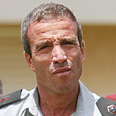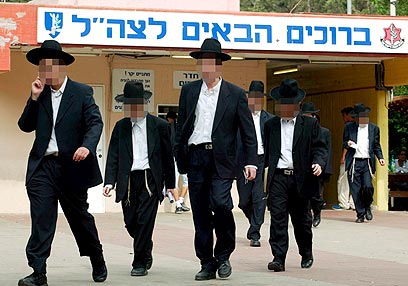
'Israel has no leadership that can draft haredim'
'It hasn't happened in 35 years – it doesn't matter who is prime minister,' says former IDF personnel chief Elazer Stern
Former IDF Personnel Directorate Brig.-Gen. (Res.) Elazar Stern was not surprised on Monday to hear about Prime Minister Benjamin Netanyahu's decision to dissolve the Plesner Committee, which was charged with devising an alternative to the Tal Law.
"I'm disappointed but I didn't have any illusions," Stern told Ynet. "Some of the committee's decisions were reasonable, but I knew that nothing would come out of it. There is no courage to make these decisions and no ability to force (the Ultra-Orthodox) to be drafted."
Related stories:
- '80% of haredim will serve in IDF by 2016'
- IDF doesn't want a haredi brigade
- Former haredi troops demand to report for reserve duty
During his time as head of the IDF's personnel division, Stern witnessed at first-hand a growth in the number of haredim joining the army, but said that attempts to expand the draft to the entire sector were destined to fail.
"There is no leadership that can do it, which will face off against the haredim and put the nation at the forefront. Maybe the government is thinking about the next elections, and that's their motivation, but we have to acknowledge that in 35 years it hasn't happened. It doesn't matter who is prime minister," Stern said.

Draft haredim into combat roles, not as support staff (Photo: Tzvika Tischler)
"The government doesn't want to find a real solution, mostly due to short-term considerations," Stern continued, noting that drafting haredim could, for example, provide an answer to the lack of reservists.
"Only haredi combat battalions will be able to ease the burden on reservists (serving) in the … Efforts should be made to draft three or four battalions of haredi fighters, like the Netzah Yehuda Battalion, and not send haredim to support bases as part of the haredi service project. If that happens, it would be enough."
Stern made it clear that he opposed personal sanctions against haredim who refuse to be drafted, but "does support equality of terms." In his opinion, there is no point in integrating haredim into non-combat roles in the army.
"They come at eight in the morning, study Torah for an hour, and return home in the afternoon. They don't do shifts and don't have to see girls, even though female IDF soldiers are dressed more modestly than (girls) in Bnei Brak or Brooklyn. (The haredim) come at a later age, and as family men receive salaries of thousands of shekels a month," Stern observed.
Nevertheless, he stressed, action must be taken to widen the pool of draftees – not necessarily for the security of the state, but also for the sake of society. "The strategic threat posed by haredim not serving isn't (a) security one, but economic and cultural," he said. "The IDF knows how to win wars without the haredim, but if they don't enter the labor market, considering that their children comprise over 30% of children in Israel's kindergartens today, the state of Israel won't be able to carry them."
What will happen, Stern warned, is that non-haredi citizens will refuse to live in Israel "if all their money goes to the haredim."
"I proposed that we let give young haredim a choice… we'll see that in 3-4 years 50% of them will go to work. Those that prefer to be drafted will be taken into the army as combat soldiers," Stern said.
"Thirty percent to 40% of young haredim entering the workforce is worth a billion and a half shekels a year for the economy – money that could be funneled to soldiers who finish their service or to combat fighters, allowing them to complete a BA on the government's bill."
Stern said that haredim entering the workforce should come before the debate on haredi draft quotas addressed by the Plesner Committee.
- Receive Ynetnews updates directly to your desktop










